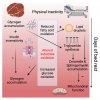Dolphin
Senior Member (Voting Rights)
https://www.cell.com/cell-reports-medicine/fulltext/S2666-3791(23)00601-8#
ARTICLE| VOLUME 5, ISSUE 1, 101372, JANUARY 16, 2024
The impact of bed rest on human skeletal muscle metabolism
ARTICLE| VOLUME 5, ISSUE 1, 101372, JANUARY 16, 2024
The impact of bed rest on human skeletal muscle metabolism
- Moritz Eggelbusch
- Braeden T. Charlton
- Alessandra Bosutti
- Bergita Ganse
- Ifigenia Giakoumaki
- Anita E. Grootemaat
- Paul W. Hendrickse
- Yorrick Jaspers
- Stephan Kemp
- Tom J. Kerkhoff
- Wendy Noort
- Michel van Weeghel
- Nicole N. van der Wel
- Julia R. Wesseling
- Petra Frings-Meuthen
- Jörn Rittweger
- Edwin R. Mulder
- Richard T. Jaspers
- Hans Degens
- Rob C.I. Wüst
Highlights- •
Muscle glycogen build-up in bed rest reduces insulin sensitivity and further storage - •
Muscle lipid overload, lipotoxicity, and inflammation develop during bed rest - •
Bed rest shifts muscle metabolism from fatty acid to glucose oxidation - •
Intrinsic mitochondrial alterations occur after long-term bed rest
Summary
Insulin sensitivity and metabolic flexibility decrease in response to bed rest, but the temporal and causal adaptations in human skeletal muscle metabolism are not fully defined.
Here, we use an integrative approach to assess human skeletal muscle metabolism during bed rest and provide a multi-system analysis of how skeletal muscle and the circulatory system adapt to short- and long-term bed rest (German Clinical Trials: DRKS00015677).
We uncover that intracellular glycogen accumulation after short-term bed rest accompanies a rapid reduction in systemic insulin sensitivity and less GLUT4 localization at the muscle cell membrane, preventing further intracellular glycogen deposition after long-term bed rest.
We provide evidence of a temporal link between the accumulation of intracellular triglycerides, lipotoxic ceramides, and sphingomyelins and an altered skeletal muscle mitochondrial structure and function after long-term bed rest.
An intracellular nutrient overload therefore represents a crucial determinant for rapid skeletal muscle insulin insensitivity and mitochondrial alterations after prolonged bed rest.
- •

